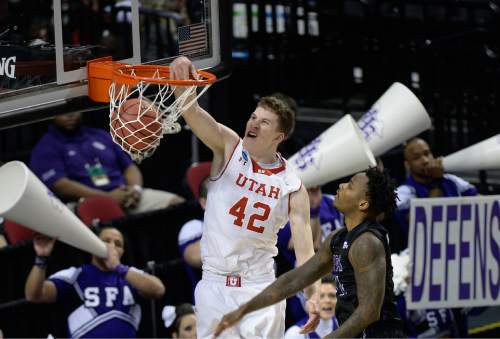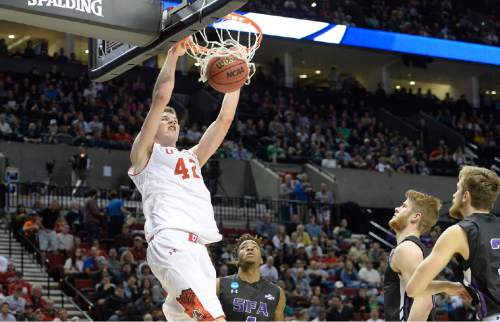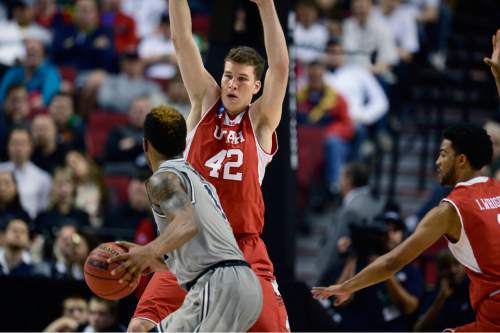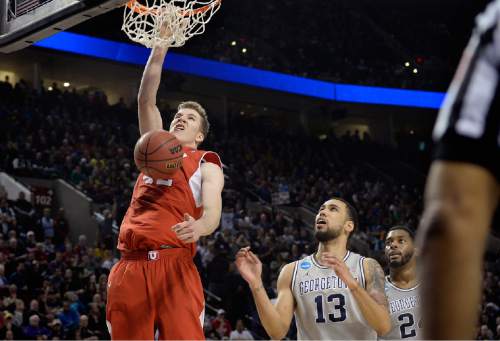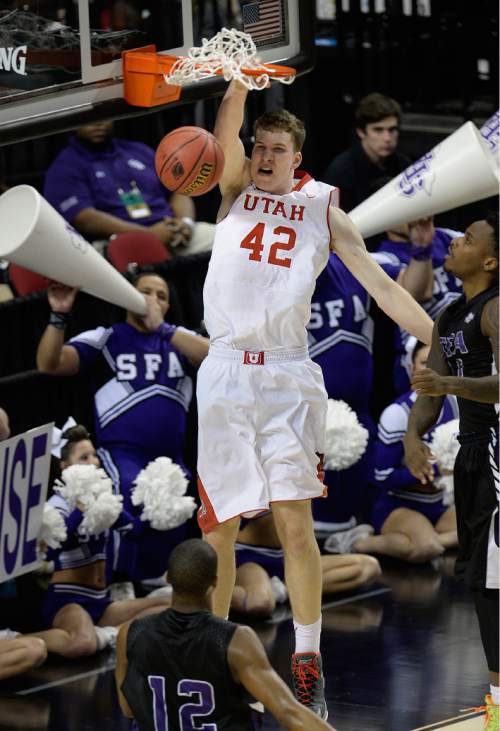This is an archived article that was published on sltrib.com in 2015, and information in the article may be outdated. It is provided only for personal research purposes and may not be reprinted.
A decision is hurtling toward Jakob Poeltl that he cannot dodge or put off.
He has to determine, once and for all, the proper way to pronounce his name here in the new country. It's not Purrrrrr-tull, like so many have pronounced it in the past. Even he, taking pity on all the lazy-mouthed Americans who have a tough time with the German-Austrian ooooo sound, the sound of an "o" followed by an "e," which approximates the umlaut-over-the-o deal, has acquiesced to the harder "r." He has to set the record straight and soften it so NBA announcers and fans will say it right.
Because that's where he's going to be playing — soon enough.
Whether that time is short or a bit less short is the real decision, and nobody can figure that out but him. Should the 19-year-old stay with the Utes for another year or go pro now?
The responses are easy, in either direction, when that decision is not yours to make.
Many say the big man should stick around a while longer to gain experience, to allow his body to mature, to get stronger and smarter and savvier, to grow his game in the low post, to refine his moves and dominate the college game. If he does that, they say, he'll better position himself in next year's draft and increase his earning potential, not to mention enable the Utes to win more games than they would otherwise. They want him to want to stay because they want him to stay.
The other side says that's kooky talk, that's just what advocates of college basketball and Utah fans want because they would benefit from having a bright young talent stick around. That second camp says the 7-footer already has shown his potential and impressed NBA player-personnel types, so there's no overly compelling reason for him to remain in the schoolboy ranks, playing for scholarship money, when he could be earning millions while honing his promising skills full time.
I've talked with a couple of NBA executives who anonymously said the kid has their attention. Poeltl has good feet, great size, can protect the rim, can anchor a defense, and they were impressed by the way he held Jahlil Okafor, projected by most experts as the first or second overall pick, to six points in Utah's loss to Duke in the Sweet 16. Poeltl's frame and game do need work, but the NBA guys said they are intrigued by what they've seen. They like the kid. Don't know what every team thinks.
The major draft sites, staffed by people who track this stuff year-round, have Poeltl as a first-rounder and some of the more respected sites have him as a lottery pick. Draftexpress, for instance, slots him in at 11. Bleacher Report has him at 13. MyNBADraft.com has him at 12. Basketball Insiders puts him at 17. ESPN tags him as mid-first-round pick. NBA Draft Room has him as its No. 6 selection in 2016.
Nobody really knows.
Looking at comparisons in remuneration, were Poeltl to come out now, he would get an annual salary of $2,070,000 if he were taken at No. 10. At 12, he'd get $1,870,000. At 15, he'd make $1,600,000. At five, he'd haul $3,120,000.
The decision isn't as much about Poeltl's own development or preparation for the NBA. It's whether his value would rise enough over the next year to make it financially worthwhile for him to stay at Utah and take a shot at a higher draft position next time around.
That's worth considering, but it's also risky. He could edge up. He could slide down. He could get hurt.
One thing is certain: If he stays in school, he won't get paid for another year.
He likely would improve at Utah and the Utes would win a load of games. That's all good and true. Purists and fans love the notion of him staying where he is and maturing here. But they aren't the ones with piles of cash stacked in front of them. What would you think if he were your son? It's not as though Poeltl is one of those dubious borderline talents so eager to go pro that they foolishly ignore the warning signs and then miss out on the remainder of great college exposure and experience.
On account of that, the hard-working and conscientious Poeltl should go now, especially if he gets any kind of assurance that he'll be selected in or within shooting distance of the lottery. If not, then double-clutch.
Let an NBA team pay him millions while he's developing, rather than developing in college for next to nothing. I know, I know, fans will slam that as a bad idea — because they aren't the ones with money at hand, they aren't the ones with their careers edging toward the starting line, they aren't the ones risking injury. They'll say he could make more in the 2016 draft, but they aren't actually sure. They try to look at it objectively, but most can't. Many try to pass his staying off as what's best for the kid when, in reality, they're concerned more about their team's best interests.
It's in the best interests of Jakob Poeltl to go while NBA teams are eager to draft him. It's the profession he wants to pursue. It's why he came to Utah in the first place. There is no guarantee he'll move up if he remains.
He should go.
Get the decision done — tell the country that it's putting too much Purrrrrr in the Poeltl. It needs to put more oooooooo sound in the pronunciation. Just like the big man needs more 00000000's in his bank account.
GORDON MONSON hosts "The Big Show" with Spence Checketts weekdays from 3-7 p.m. on 97.5 FM and 1280 AM The Zone. Twitter: @GordonMonson.


